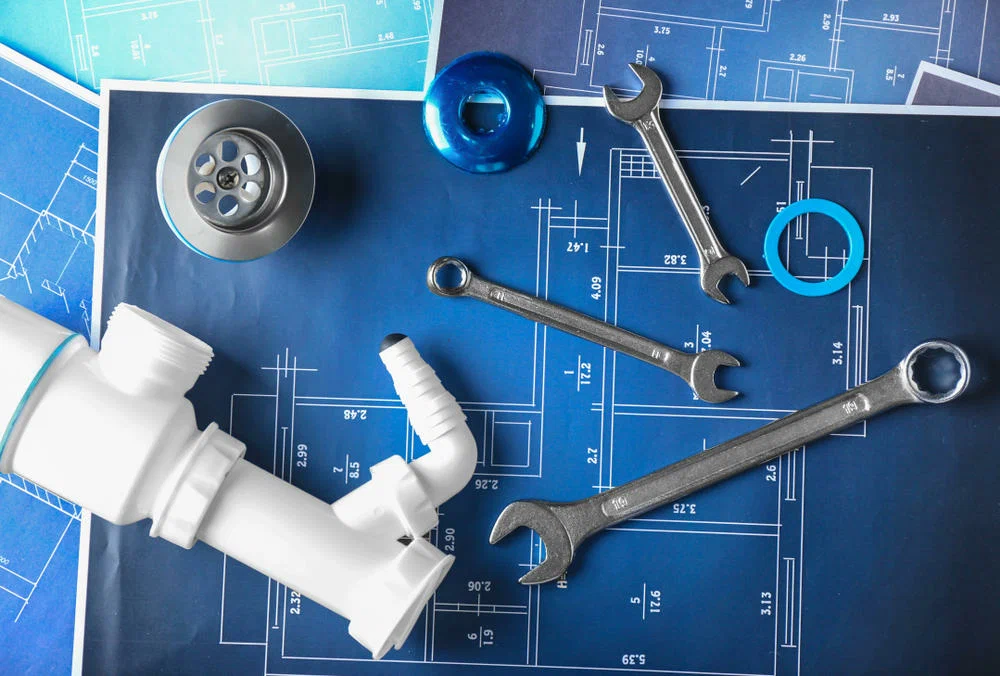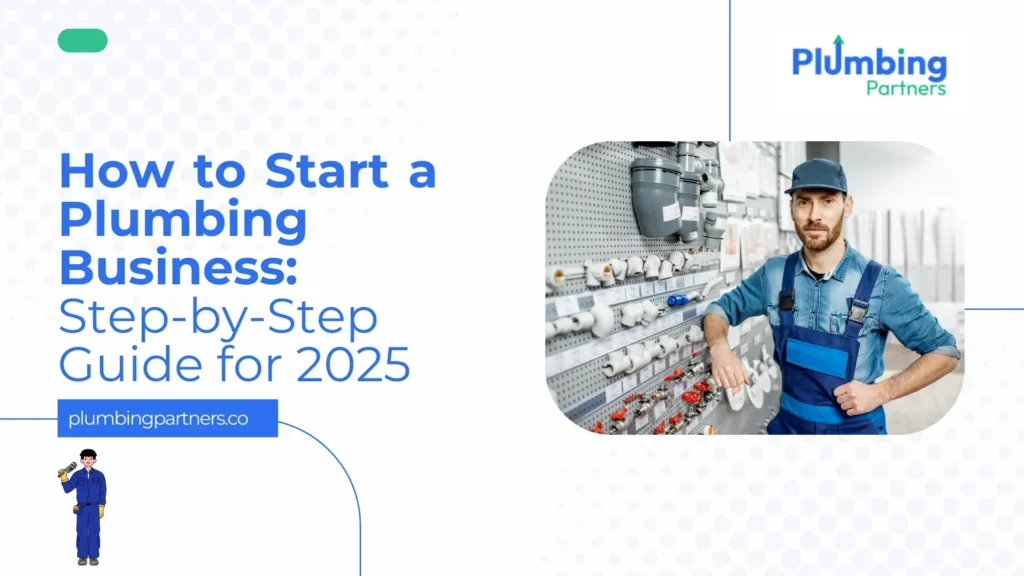Understanding the Plumbing Industry
The plumbing industry plays a crucial role in modern infrastructure, generating $129.1 billion in revenue annually and employing over half a million professionals. With consistent demand for skilled labor, starting a plumbing business in 2025 offers tremendous potential for growth and profitability. Whether you’re transitioning from working for a private company or entering the trade as a self-employed professional, the industry provides job security, financial independence, and flexibility.
Is Starting a Plumbing Business Profitable in 2025?
Yes, starting a plumbing business is highly profitable. The skilled labor shortage continues to drive up demand, giving plumbing businesses the ability to set competitive rates. Self-employed plumbers can earn an average of $80,000 per year or $38 per hour, with experienced professionals earning even more. The growing need for residential plumbing, commercial contracts, and niche services like pipefitting or steam fitting ensures consistent income opportunities.
How Much Does It Cost to Start a Plumbing Business?
The cost of starting a plumbing business ranges from $10,000 to $50,000, depending on factors like licensing, equipment, and marketing. Here’s a breakdown of some common expenses:
- Licenses and Permits: $75–$400
- Insurance: $600–$2,000 annually
- Plumbing Tools and Equipment: $5,000+
- Work Truck or Van: $3,000–$30,000
- Marketing and Advertising: $2,500+
Additional costs may arise for specialized training or building a robust online presence through SEO and local search strategies.
Planning Your Plumbing Business

Write a Comprehensive Business Plan
A business plan serves as the backbone of your plumbing company. It should outline your mission statement, target market, services offered, financial projections, and marketing strategies. Include an executive summary that provides a snapshot of your goals and unique selling proposition (USP). This document is essential for attracting investors and keeping your business on track.
Set Plumbing Business Goals
Clearly defined goals help you measure your progress. Use the SMART framework (Specific, Measurable, Achievable, Relevant, Timed) to establish short-term and long-term objectives. For example:
- Earn $90,000 in revenue within the first year.
- Gain 20 five-star Google reviews within six months.
- Hire your first technician by year two.
Identify Your Unique Selling Proposition (USP)
Your USP sets you apart from competitors. Examples include 24/7 emergency services, eco-friendly plumbing, or expertise in commercial contracts. Highlight these strengths in your website, marketing materials, and Google Business Profile to attract your ideal clients.
Study Local Government Regulations
Every state has specific licensing and permitting requirements. Research your local plumbing codes, liability insurance needs, and licensing exams. For example, states like California and New York require master plumber certifications, while others, like Kansas, may have more lenient regulations. Compliance is key to avoiding fines and legal issues.
| State | Institution |
| Alabama | International Code Council (IPC) |
| Alaska | International Association of Plumbing and Mechanical Officials (UPC) |
| Arizona | International Code Council (IPC) |
| Arkansas | International Code Council (IPC) |
| California | International Association of Plumbing and Mechanical Officials (UPC) |
| Colorado | International Code Council (IPC) |
| Connecticut | International Code Council (IPC) |
| Delaware | International Code Council (IPC) |
| Florida | International Code Council (IPC) |
| Georgia | International Code Council (IPC) |
| Hawaii | Uniform Plumbing Code (UPC) |
| Idaho | Uniform Plumbing Code (UPC) |
| Illinois | Illinois Plumbing Code |
| Indiana | Indiana Plumbing Code; International Association of Plumbing and Mechanical Officials (UPC) |
| Iowa | International Association of Plumbing and Mechanical Officials (UPC); International Code Council (IPC) |
| Kansas | International Code Council (IPC) |
| Kentucky | Kentucky State Plumbing Code; National Plumbing Code Coordinating Committee |
| Louisiana | Louisiana State Plumbing Code |
| Maine | Maine Internal Plumbing Code |
| Maryland | International Code Council (IPC) |
| Massachusetts | Massachusetts Uniform State Plumbing Code |
| Michigan | International Code Council (IPC) |
| Minnesota | Minnesota Plumbing Code |
| Mississippi | International Code Council (IPC) |
| Missouri | International Association of Plumbing and Mechanical Officials (UPC) |
| Montana | International Association of Plumbing and Mechanical Officials (UPC) |
| Nebraska | International Code Council (IPC) |
| Nevada | International Code Council (IPC); International Association of Plumbing and Mechanical Officials (UPC) |
| New Hampshire | International Code Council (IPC) |
| New Jersey | National Standard Plumbing Code (NSPC) |
| New Mexico | New Mexico Plumbing Code; International Association of Plumbing and Mechanical Officials (UPC) |
| New York | International Code Council (IPC) |
| North Carolina | International Code Council (IPC) |
| North Dakota | International Code Council (IPC) |
| Ohio | International Code Council (IPC) |
| Oklahoma | International Code Council (IPC) |
| Oregon | Oregon Specialty Plumbing Code; International Association of Plumbing and Mechanical Officials (UPC) |
| Pennsylvania | International Code Council (IPC) |
| Rhode Island | International Code Council (IPC) |
| South Carolina | International Code Council (IPC) |
| South Dakota | International Association of Plumbing and Mechanical Officials (UPC) |
| Tennessee | International Code Council (IPC) |
| Texas | International Code Council (IPC) |
| Utah | International Code Council (IPC) |
| Vermont | International Code Council (IPC) |
| Virginia | International Code Council (IPC) |
| Washington | International Association of Plumbing and Mechanical Officials (UPC) |
| West Virginia | International Code Council (IPC) |
| Wisconsin | Wisconsin Statues, Comm 81-87, Plumbing Code |
| Wyoming | International Plumbing Code (IPC) |
Setting Up Your Plumbing Business

Register Your Business Name and Entity
Choose a memorable business name that reflects your brand, such as “Plumbing Partners.” Register as an LLC or sole proprietorship to protect your personal assets. Check the USPTO Trademark Search System (TESS) to ensure your name is unique.
Secure Required Licenses and Permits
Obtain a plumbing license by completing required training or apprenticeship programs and passing the necessary exams. You may also need local permits for specific jobs to comply with building codes and safety standards.
Set Up Business Accounting and Taxes
Invest in accounting software like QuickBooks or hire an accountant to manage your finances. Separate your personal and business finances by opening a business checking account, and stay on top of state and federal tax requirements.
Get Plumbing Business Insurance
Insurance protects your business and builds trust with clients. Essential policies include:
- General Liability Insurance: Covers property damage and bodily injury.
- Commercial Auto Insurance: Protects company vehicles.
- Workers’ Compensation: Covers employee injuries on the job.
Building the Foundation of Your Plumbing Business
Decide What Plumbing Services to Offer
Focus on services that align with your expertise and market demand. Options include residential repairs, commercial installations, emergency plumbing, and specialized services like water heater maintenance or sprinkler system installations.
Invest in the Right Plumbing Equipment
Purchase high-quality tools and materials, including adjustable wrenches, pipe cutters, cordless drills, and safety gear like goggles and gloves. Consider buying a reliable work truck to transport equipment efficiently.
Hire Qualified Technicians
Expand your team by hiring skilled plumbers who align with your company’s values. Post job listings on Indeed, social media, and your website, and conduct thorough interviews to ensure you hire the right candidates.
Set Competitive Pricing for Your Services
Research competitors’ pricing to establish fair rates. Use a formula that factors in labor, materials, overhead costs, and a reasonable profit margin. Regularly review and adjust your pricing based on market trends and customer feedback.
Financing Your Plumbing Business

How to Secure Business Financing
Explore funding options like:
- Small Business Administration (SBA) loans
- Online lenders (e.g., Fundera, OnDeck)
- Business grants for home services
- Personal savings or loans from friends and family
Prepare a strong business plan to present to potential investors or lenders.
Budgeting for Plumbing Equipment and Marketing
Allocate funds wisely by prioritizing essential purchases. Start with basic tools and gradually invest in advanced equipment. Dedicate a portion of your budget to digital marketing, including SEO, PPC advertising, and social media campaigns.
Marketing and Growing Your Plumbing Business
Create a Professional Business Website
A well-designed website is crucial for attracting clients. Include information about your services, pricing, and contact details. Publish blogs and how-to guides to improve SEO and establish authority in your niche.
Develop a Lead Generation System
Utilize Google Business Profile, local SEO, and lead generation platforms like Thumbtack and HomeAdvisor to secure high-quality leads. Focus on building a strong referral network to expand your client base.
Optimize Your Online Presence (SEO, Reviews, and Social Media)
Rank higher on search engines by targeting geo-specific keywords like “plumbers in [city].” Encourage satisfied customers to leave positive reviews on Google and Facebook, and maintain an active presence on platforms like Instagram and YouTube.
Use Referral Programs to Attract Clients
Offer discounts or incentives to existing clients who refer new customers. Word-of-mouth marketing is a powerful tool in the plumbing industry.
Expand Services and Service Areas Strategically
As your business grows, consider adding new services like eco-friendly plumbing solutions or expanding into neighboring cities. This diversification can boost revenue and market reach.
Moving Forward With Your Plumbing Business in 2025
Starting a plumbing business in 2025 presents incredible opportunities for growth and success. By following the steps outlined in this guide, you can establish a strong foundation, differentiate your services, and build a sustainable business. Focus on creating a professional online presence, offering exceptional customer service, and continuously adapting to market trends. With dedication, strategic planning, and effective marketing, your plumbing business can thrive in this competitive industry and become a trusted name in your community.
To further ensure your success, consider leveraging expert plumbing marketing services from Plumbing Partners, a trusted resource for growing your brand, generating leads, and achieving long-term success in the plumbing industry.
FAQs About Starting a Plumbing Business
- Can You Start a Plumbing Business Without Being a Plumber?
Yes, but you’ll need to hire licensed plumbers to perform the work. Focus on managing business operations, marketing, and finances while your team handles the technical aspects. - How Much Do Plumbers Earn?
Plumbers average salary data shows that they earn an average of $61,550 per year or $29.59 per hour, depending on experience and location. Master plumbers and business owners typically earn more. - How to Expand a Plumbing Business?
Focus on building a loyal customer base, offering additional services, and investing in technology like dispatching software. Networking and maintaining strong online reviews are also critical. - What Are the Best Marketing Strategies for a Plumbing Business?
Effective strategies include local SEO, PPC advertising, social media marketing, and referral programs. Maintaining a strong online reputation through customer reviews can also help attract more clients. - What is the revenue potential of the plumbing industry in 2025?
The plumbing industry generates over $129 billion annually, offering significant opportunities for new businesses to thrive.




